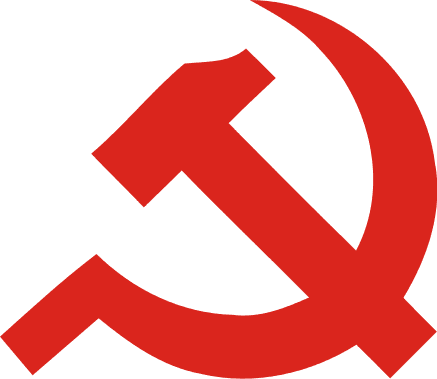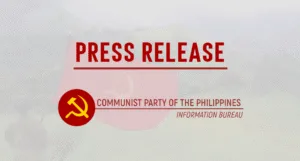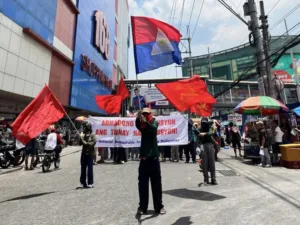Marco Valbuena | Chief Information Officer | Communist Party of the Philippines
We make the following key observations regarding the recently concluded reactionary elections:
1. The results of the mid-term elections are utterly discredited amid overwhelming evidence of widespread and systematic fraud perpetrated principally through automated cheating, as well as through vote-buying, election violence, disinformation, Red-tagging and other means. This stems largely from the failure of the Commission on Elections (Comelec) to ensure transparency in the automated counting system provided by the Miru Systems Co, a South Korean company whose record is tainted by election failures and bribery in other countries.
Technical experts have pointed out that the system installed in the counting machines was not thoroughly reviewed, and that certification was not made in accordance with procedures. Worse, the Comelec made a highly-questionable last-minute “upgrade” to the software system installed on the counting machines (other than the certified version) which took away all public trust, as it seriously compromised the integrity of the counting system. Experts expressed fears that this could have been used to inject malicious code and algorithms to manipulate the outcome of the vote count.
There were widespread media reports of voters complaining that receipts issued by the Miru counting machines did not correctly report their votes, either their votes overcounted or undercounted. The election watchdog Parish Pastoral Council for Responsible Voting (PPCRV) said it received an unprecedented volume of complaints in the first hours, surpassing anything they have seen in monitoring automated elections since it was introduced in 2010 in the Philippines. In addition, observers reported of vote-buying (especially through the release of government funds for social aid) and pre-shading of ballots.
There also were various reports of anomalies during the quick count of major media outlets and election watchdogs. On the one hand, the PPCRV reported of “unusual delays. On the other hand, there were “duplicates” in the uploading of election results, in which supposedly 15,000 election returns comprising five million votes were reported by the media as being “double counted” during the first hours of “quick count,” then subsequently “corrected” without transparent and proper auditing and processing. The Comelec claims of a historic 81.37% voter turnout. However, the National Movement for Free Elections claims there are around 18 million votes overcounted, based directly on data from the counting machines.
All these anomalies are being dismissed by the Comelec as mere “glitches,” which observers criticize as a gross understatement of the severity of these anomalies. The International Observer Mission describes the disenfranchisement as massive.
The rampant anomalies surrounding the conduct of the recent elections has galvanized various political groups and election watchdogs to demand a manual recount of votes. It also strengthens the long-standing demand to put an end to automated counting and return to manual counting (combined with electronic transmission), in a push to ensure that electoral votes are properly counted.
2. With the strategic view of securing its long-term economic and geopolitical interests, the US imperialists played a key role in the recent Philippine elections. It exercised direct and indirect influence over the various reactionary cliques, leveraged its total control over the military and defense establishment, and fully employed its interventionist arsenal (political, diplomatic and technical). Deals and accommodations were brokered at the highest levels by the US imperialists through their agents, brazenly displaying reactionary transactional politics that has long characterized the Philippine political system.
Keen to the crucial part the Philippines plays in its “Indo-Pacific Strategy” against China, the US imperialists seek to ensure the stability and tighten its control over its client regime. They are deeply concerned by (a) the increasingly violent conflict between the Marcos and Duterte cliques that is rousing people to resist the rotten ruling system; (b) the deepening rifts within the ruling clique, and growing isolation of the Marcos puppet regime amid the sharp socioeconomic downturn; and (c) the considerable strength and challenge of the Duterte camp, through which China is able to find ground to grow its political influence.
Specifically, the US imperialists are concerned whether the Marcos ruling clique can frustrate the presidential bid of Sara Duterte, especially if she is not impeached by the Senate. Thus, while continuing to extend military and political support to the ruling Marcos clique, the US imperialists availed of their ties with their operatives, power brokers, financiers and intermediaries among the Philippine ruling class political and business circles to influence and manipulate the elections in order to develop a “third force” from among the US-friendly groups currently aligned with the Liberal-Akbayan-Pink (LAP) coalition of heterogeneous political forces.
The US wants this group to serve as “reserve horse” to the Marcos clique, while providing critical support to increasing US military presence in the Philippines, non-stop war games and US intervention in AFP counterinsurgency operations. Strategically, the US hopes to eliminate China’s influence among the ruling class circles, and see the return of the old setup where the various political cliques are all friendly or beholden to the US, while anti-imperialist forces of the national democratic movement are subjected to political repression.
Much to their “surprise”, LAP-endorsed candidates Bam Aquino and Francis Pangilinan, were catapulted to the 2nd and 5th positions (from just outside the winning circle in various polls days before the elections). This “strong showing” is now being credited to the endorsement of former Vice President Leni Robredo, who is among those being groomed for a comeback against the Dutertes in 2028. Much to the dismay of many, Robredo engaged in transactional politics when she endorsed rabid pro-Duterte and Iglesia ni Cristo (INC) candidate Rodante Marcoleta (who led Duterte’s charge against ABS-CBN in 2020) in exchange for the INC’s endorsement of Aquino. Marcoleta, also “surprisingly”, landed sixth. She also endorsed Marcos candidates Manny Pacquiao and Benhur Abalos, but is reported to have refused to outrightly endorse other Pink candidates.
The entry of both Aquino and Pangilinan helps Marcos secure an anti-Duterte majority in the Senate. However, he only has a precarious two-thirds required to ensure the impeachment of Vice President Sara Duterte. While Marcos wants to prevent her from running in 2028, he also remains wary that an impeachment trial may explode into a full blown political crisis, and as such has distanced himself from the process.
The LAP coalition also counts among its ranks prominent human rights lawyer Chel Diokno and former senator Leila de Lima, who won seats in the House of Representatives through the party-list system. Both have stood firmly against Duterte’s drug-war and have long been allies of people’s organizations in the defense of human rights.
The LAP group have remained silent amid the lack of transparency of the just concluded elections, and is merely sweeping aside reports of anomalies. Key people in the LAP group, many of whom kept quiet after widespread fraud gave the Marcoses and Dutertes 32 million votes in 2022, are now also keeping quiet over widespread anomalies involving the Miru Systems. They can only explain the “surprising” performance of Aquino and Pangilinan with such conjectures as the “Gen-Z vote” and other political postulations.
The crisis of the ruling political system continue to intensify amid the increasing polarization among the reactionary cliques. This is bound to intensify as we approach the 2028 presidential elections. The Marcos regime continues to become increasingly isolated from the people due to its anti-national and anti-people policies and programs. The US political scheme to bolster the LAP group has apparently weakened the Marcos clique. This runs counter to Marcos family’s plan to perpetuate their reign. Memories of how the US government “rescued” and flew the Marcos family to Hawaii during 1986 remain in the minds of the Marcoses. It remains to be seen whether the Marcoses will accede or not.
The LAP group is set to strengthen their bid for the 2028 elections. The coalition can come up with a common contender but will still have to overcome differences among its disparate forces.
Despite the impeachment of Sara Duterte and imprisonment of Rodrigo Duterte in The Hague, their camp continues to exert political influence with their links within the military, the support of local factions of the ruling classes and indirect support of China. They are able to deceive the public through the use of social media influencers and troll armies for hire. It, however, will have to deal with internal rifts with the rise in influence and strength of some quarters within its inner circle and the Duterte family itself (especially with Duterte’s long-time sidekick Bong Go landing on the top spot of the Senate race).
3. Based on initial results, the recent mid-term elections saw the further disenfranchisement of party-list groups representing the basic sectors of Philippine society, especially those aligned with the national democratic movement. The party-list system is now being dominated by groups funded and controlled by ruling class politicians and dynasties.
The push to disenfranchise the progressive party-list groups, carried out alongside the intense counter-campaign against the Makabayan Coalition, is in line with the strategic goal of the US and its fascist security and defense agents in the NTF-Elcac and National Security Council to push out patriotic and democratic representatives in parliament who have been a thorn on the sides of past reactionary regimes. This is because they have consistently raised people’s issues, exposed corruption, and denounced human rights violations. They are militantly resisting the subservience of the ruling Marcos regime to US schemes to use the Philippines as springboard for its war preparations and provocations against its imperialist rival China, a scheme which Akbayan and its stalwart Risa Hontiveros have acquiesced to and are actively supporting.
Through its various tentacles and funding programs, the US has been promoting an “acceptable ‘Left’,” (sometimes called “authorized’ or ‘tolerated Left’) composed of bourgeois reformist groups that are misrepresented as “progressive” or “socialists.” These groups are “acceptable” because these do not challenge the class dominance of pro-US big bourgeois compradors, bureaucrat capitalists and big landlords, nor actively oppose US military, political, economic and cultural domination. The aim is to counter the strength and influence of the national democratic forces in the Philippines, which have consistently called for national liberation from US imperialist control, and the transformation of the oppressive and exploitative class structures in the country.
Over the past few elections, these progressive party-list groups, which have consistently topped party-list elections through the 2000s and 2010s, have been targets of intensive campaign of political repression in the form of extrajudicial killings, abductions, arrests, Red-tagging and military attacks to force members of their local chapters to disaffiliate. The US-backed state-sponsored campaign against the progressive party list groups intensified starting 2019 and has continued under the US-Marcos regime, aiming to cripple these groups’ ability to effectively mount a nationwide electoral campaign. They have been targets of electoral fraud in the form of automated vote shaving to progressively reduce their share of the parliamentary seats over the past several elections. Of all the tactics employed against them by the AFP-NTF-Elcac, this is the most direct blow that aims to knock them out of the electoral race.
The attacks against the Makabayan are clearly orchestrated by the US, the Marcos regime and its NTF-Elcac in line with its recently issued Memorandum Order No. 83 or its so-called National Action Plan for Unity, Peace and Development. Even the Comelec felt the NTF-Elcac’s heat when it failed to lift a finger despite declaring that Red-tagging is an “election offense.” The push to disenfranchise grassroots people’s organizations is being carried out in the guise of suppressing “insurgency in electoral disguise,” which, in fact, has the countereffect of pushing more and more people to join the armed revolution.
It is to the credit of these party-list groups, along with the progressive and patriotic senatorial candidates under the Makabayan coalition, that they were able to mount a formidable electoral campaign, despite the brazen push of Marcos and the NTF-Elcac to suppress their efforts. Their candidates and campaigners defied the threats of Marcos’ fascist agents and its suppression schemes, as they mounted a nationwide grassroots campaign to link up and strengthen their ranks among the broad masses.
These groups, along with unions, student mass organizations, peasant and urban-poor community associations, among others, face the great political challenge to expand and strengthen their organized ranks by severalfold in order to raise their capability of resisting US political and military intervention and fighting for the people’s urgent demands. They must build, consolidate and expand their solid grassroots organized strength. This solid organized strength is the basic requirement for them to effectively carry forward the anti-fascist, antifeudal and anti-imperialist fight against the US-Marcos regime.
They must fight and isolate the US-Marcos regime by intensifying the people’s struggle for wage increases, jobs and lower prices, and their resistance to political repression and economic dispossession. They will have to build a broad united front and develop a strong movement against heightening US military intervention in the Philippines that is putting the country in danger of being dragged into a US-provoked armed conflict with China.
In the coming months, the democratic mass movement must mobilize the broad masses of the people and unite all positive forces, including some newly-elected members of congress, to push for the people’s demand for the conviction of Vice President Sara Duterte in the Senate for corruption and various wrongdoings, and that of Rodrigo Duterte in the International Criminal Court for crimes against humanity. They must continue to recall the fascist crimes, corruption and oppression of the Duterte regime to counter the lies and deception being hoisted on the Filipino people.
4. The rotten core of the reactionary political system, currently dominated by the fascist and corrupt Marcos and Duterte political dynasties and their followers, has been further exposed during the past elections, marked by automated fraud, political accommodations and systematic attacks to disenfranchise the broad masses of the people. Given the results of the 2025 elections dominated by the old and new representatives of the ruling classes, it is certain that the Filipino people will continue to suffer even worse oppression, economic hardships and political repression under the policies and programs of the US-Marcos regime.
The outcome of the 2025 elections only reaffirms the necessity of fighting for genuine national freedom and people’s democracy, where the interests of the broad masses of workers, peasants, the toiling people and other democratic and patriotic sectors and classes are prioritized. It reaffirms the necessity of waging revolutionary armed struggle through protracted people’s war.
Every elections, reactionary parties and politicians make false promises of “change,” in a contemptuous appeal to the broad masses of the Filipino people who have long demanded change. The people’s demand for fundamental change is being amplified further as they suffer from worsening socioeconomic conditions. The more that the rotten and corrupt system becomes exposed, the more that it becomes clear to the Filipino people that change will not come from these reactionary politicians and bureaucrat capitalists who promise them change. Even as they challenge the electoral dominance of the people’s oppressors, they must set their sights on the path of resistance beyond the elections.
Change will be attained only by the people struggling collectively and waging a fight against those who resist change. In the revolutionary areas, change is arising as the oppressed people organize their ranks and arm themselves to shift the balance of power and alter the oppressive and exploitative class relations.
By waging people’s war, the seeds of the people’s democratic government are being sown in the countryside. Revolutionary forces persevere in establishing the organs of political power, or basic units of the people’s democratic government, that are built on the foundations of the people’s organized and armed strength. This stand in stark contrast to the reactionary government whose oppressive weight is being imposed on the people. The Party and the New People’s Army, as well as all the revolutionary mass organizations of the National Democratic Front both in the cities and guerrilla zones, are continuously growing in strength and numbers.
In this light, we call on the Filipino people to join and support the New People’s Army in any of its units across the country. We urge all able-bodied and mentally fit people, especially young people, to serve as Red fighters of the NPA. Only by enduring the hardships and necessary sacrifices in waging people’s war, can the people change the course of Philippine history to attain their aspiration for national and social liberation.
The post Key observations regarding the recent reactionary midterm elections appeared first on PRWC | Philippine Revolution Web Central.











